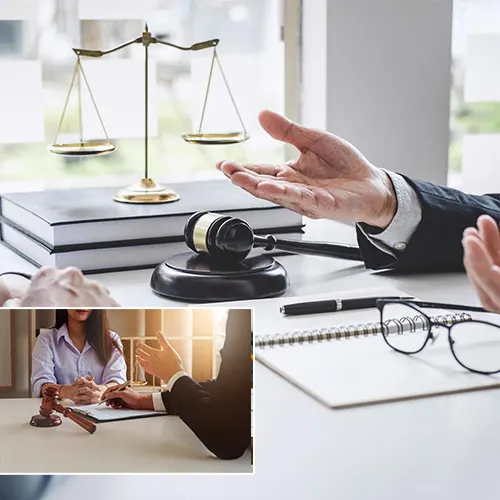Essential Guide: Recording DUI Traffic Stops Legally and Safely
Table of Contents []
Recording DUI Traffic Stops
Welcome to Divorce & Family Law: Your Guide to Recording DUI Traffic Stops

In today's world, the power of a recording cannot be underestimated, especially when it comes to something as serious as a traffic stop. At Divorce & Family Law, we understand how crucial it is to ensure that legal compliance is maintained during these tense encounters. That's why we are committed to educating individuals on their rights and offering comprehensive advice on how to record DUI traffic stops properly. Whether you're a driver or have loved ones on the road, knowledge is your best defense.
Our team is passionate about securing justice and transparency, which is why we emphasize the importance of recordings. They can serve as undisputed evidence that protects both the civilian's and the officer's rights. Many clients have found peace of mind knowing they acted within their rights by documenting their interactions.
Now, imagine you're pulled over-it could be nerve-wracking, right? It's critical to remain calm and remember that you are equipped with the ability to document the encounter. Our team at Divorce & Family Law is here to enlighten you on how to do just that, while ensuring a fair and legal process for everyone involved. Got any questions or need to book an appointment? You can easily reach us at (512) 501-5859.
Your Rights and Responsibilities
You have the right to record police officers in public places, and a traffic stop is no exception. Understanding this right is the first step toward empowerment. However, there are responsibilities you must uphold. While you record, you must not interfere with the officer's duties. It's a delicate balance, but when performed correctly, recording can be a powerful form of accountability.
Our experts at Divorce & Family Law always advise being upfront with the officer about your intention to record; it's both a courtesy and often can help defuse potential misunderstandings. Remember that your safety and legal rights come first, so if the situation escalates, focus on de-escalation.
Best Practices for Recording
The way you record during a traffic stop is just as important as the decision to record itself. Make sure your device is charged, and start recording before the officer approaches your vehicle. Keep your hands visible at all times, and inform the officer that you are recording for your records. Respectful communication can go a long way in ensuring a smooth interaction.
If it's dark, use the proper lighting feature on your device so the recording is clear. And very importantly, make sure that your recording does not distract you from complying with the officer's lawful requests. At Divorce & Family Law, our legal professionals can help you understand these nuances clearly.
How to Utilize Recordings in Legal Proceedings
Should your traffic stop lead to legal proceedings, a recording can be invaluable evidence. We've seen many cases where recordings have been decisive in court. But it's not just about having the footage-it's about understanding how to present it effectively. This is where our accessible and knowledgeable legal professionals come into play.
Divorce & Family Law prides itself on its cadre of skilled attorneys who can guide you through the process of leveraging your recordings. These professionals are adept in the subtleties of the law and know how to utilize such evidence to uphold justice.
Best Equipment for Capturing Clear Evidence

When it comes to recording DUI traffic stops, quality matters. Our specialists recommend using a smartphone or a dedicated dashcam that records in high definition. When every detail could count towards proving your case, you don't want to leave anything to chance with low-quality visuals or poor audio.
Considering factors like battery life, memory capacity, and ease of access, we've compiled a list of the best recording equipment that won't let you down in critical moments. Maximizing clarity and reliability ensures that your recording can stand up as solid evidence if the need arises. For personalized recommendations, just give us a call at (512) 501-5859.
Smartphones
Most people have a smartphone, making it the most accessible recording device. The key to using your phone effectively is to have a clear understanding of how to quickly start recording. Practicing this can save precious seconds during a traffic stop. Many smartphones also have voice-activated features that could be useful in this situation.
Not only are smartphones user-friendly, but with cloud storage options, they offer ways to back up recordings instantly. This prevents data loss and ensures the recording is preserved, even if the phone is damaged or confiscated during the stop. Our advice is to familiarize yourself with these features ahead of time.
Dashcams
Dashcams are an unobtrusive and constant witness to everything that transpires during your drive. They can automatically record continuously or be activated by specific triggers such as sudden motion or impact. The use of a dashcam takes the onus off of you to actively manage the recording process during a traffic stop.
Dashcams come with a range of features, including night vision, wide-angle recording, and even GPS logs. We believe they are a worthwhile investment for any driver. Our team can advise on the best models to suit your needs and ensure you're always prepared.
Backup Storage
In today's digital age, backing up your recordings is as important as making them. Our experts strongly recommend using cloud storage services that automatically upload your recordings. This means that even if your physical device is lost or destroyed, your evidence is not compromised.
Divorce & Family Law stresses the critical nature of safeguarding your evidence with reliable backup solutions. Cloud storage services are often encrypted and require strong passwords, which adds an extra layer of security to your valuable recordings.
Know Your State's Recording Laws

Legalities surrounding recording can vary from state to state. It's essential to know the laws specific to your location to ensure that your recording is lawful and admissible in court. Divorce & Family Law can provide guidance on this topic. However, it's important to note that federal law permits recording in public spaces, as long as you're not interfering with an officer's duty.
We encourage drivers to educate themselves on the One-Party Consent' and Two-Party Consent' laws as they relate to audio recordings. Knowing these nuances can be the difference between a useful recording and one that violates privacy laws, which can have serious consequences. Our team can help clarify these points for you with just a quick call to (512) 501-5859.
One-Party Consent States
In 'One-Party Consent' states, only one person in a conversation needs to know that the recording is taking place-in this case, it could be just you. This can simplify the process when recording audio during a traffic stop, as you do not necessarily need the officer's permission.
It is, however, considered good practice and polite to inform all parties involved that they are being recorded. Despite the legalities, transparency often ensures smoother proceedings and can foster trust.
Two-Party Consent States
'Two-Party Consent' states require all involved in the communication to agree to the recording. If you live in one of these states, it is essential to notify the officer that you are recording the traffic stop. Noncompliance with this law can lead to your recording being inadmissible, or worse, you could face legal penalties.
Though it might seem cumbersome, following the law to the letter is the best way to ensure your rights are protected. Divorce & Family Law is all about acting responsibly while asserting your legal rights. We can provide insights and advice on how to handle recordings in any state.
Exceptions and Special Circumstances
There are always exceptions to the rule, and our team is well-versed in these special circumstances. For instance, certain areas might have specific personal privacy laws that can affect your right to record. We can help you navigate these complexities and ensure that your actions remain within legal boundaries.
Should there be any confusion about recording laws in your area or how they apply to traffic stops, Divorce & Family Law is your go-to resource. We're only a call away from providing you with individualized advice on this intricate topic.
Documenting Your DUI Traffic Stop

A DUI traffic stop could potentially be life-altering, and having a clear record of the events can significantly impact the outcome. Documentation serves as an objective witness, possibly corroborating your version of the events or confirming the legality of the procedures followed. We are experts in educating our clients on best recording practices and the significance of meticulous documentation.
From the moment the police lights flash behind you, consider the situation an opportunity to create a thorough record. Divorce & Family Law suggests narrating the events as they happen, keeping a mental note of times, the officer's badge number, and patrol car number, if possible. Documenting all of these details will paint a clearer picture of the stop's progression.
During the Stop
Conduct is key during the stop. Act respectfully and comply with reasonable requests. If you choose to decline any tests or searches, do so respectfully and clearly. Having a calm demeanor, communicated clearly on tape, can be beneficial to your case.
Be observant. Note the officer's action, the instructions given, and your responses. Your recording device should capture this, but your additional notes can be invaluable. Sometimes the context provided by your observations can bring clarity to a recording that audio or video alone cannot provide.
After the Stop
Once a traffic stop concludes, your job isn't quite done. It's wise to make immediate notes summarizing the event while it's fresh in your mind. If there were any witnesses, try to get their contact information. These details, combined with the recording, will form a robust defense if necessary.
Should you find yourself needing legal assistance, the detailed documentation will allow our attorneys at Divorce & Family Law to better understand and analyze your situation. We can use your vigilance to build a stronger case on your behalf.
Securing Legal Assistance
If the traffic stop leads to legal charges, having immediate legal support can be essential. Timing is critical in these situations. Our lawyers specialize in cases involving DUI traffic stops and can use your recordings to protect your rights.
Don't hesitate. Securing legal representation quickly can help ensure that your rights are asserted from the outset. At Divorce & Family Law, we excel at navigating these waters and are ready to support you. Just call us at (512) 501-5859 for quick assistance.
Divorce & Family Law: Here When You Need Us

Nobody wants to be in a situation that requires recording a DUI traffic stop, but if you find yourself there, you'll be glad to have Divorce & Family Law on your side. Our guidance on recording traffic stops is only the beginning of what we offer. We educate our clients about their rights, and we're proud to help protect those rights.
We believe that knowledge, preparation, and the right support can make all the difference. Our legal team is highly skilled in using recordings as part of an effective defense strategy. With our advice and representation, you can navigate these challenging situations with confidence.
Remember, we are a national company ready to serve you no matter where you are. If you have questions about recording DUI traffic stops or if you need legal support, reach out to us. We're here to educate, assist, and empower you with every step. For expert advice or to book a confidential appointment, call (512) 501-5859. Let us be your ally on the road to justice.
